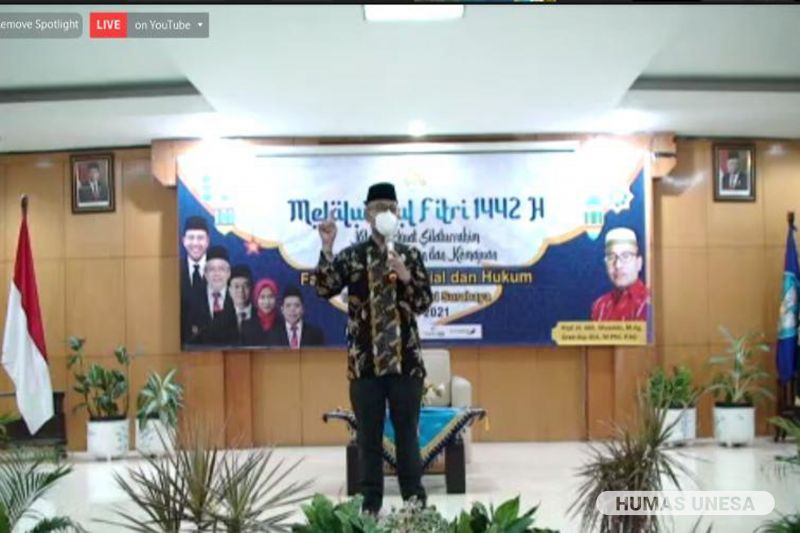
www.unesa.ac.id
Unesa.ad.id, Surabaya-Faculty of Social Sciences and Law (FISH) UNESA held a Halalbihalal with the theme 'Strengthening Gatherings for Togetherness and Progress of the Faculty of Social Sciences and Law UNESA' on Friday (04/6/2021). The event which was held in a hybrid manner was attended by the dean, the ranks of vice deans, the head of the department, the head of the study program and the academic community around FISH Unesa. Prof. H. Akhmad Muzakki, M.Ag., Grad. Dip, SEA., M. Phil., Ph.D were present as lecturers in the activity.
Dr. Bambang Sigit Widodo, M.Pd Deputy Dean for Student Affairs and Alumni FISH UNESA in his speech said that halalbihalal has two meanings. First, it can be interpreted as a gathering place. "We haven't seen each other in a long time because of the pandemic and hopefully," he hoped.
Second, it can mean to forgive and forgive each other. According to him, forgiveness is easy to say, but difficult to do. Based on the results of research, forgiveness turns out to have a good impact on health; avoid depression, stress, and the soul becomes lighter. “Perhaps all this time, there have been and many wrong words and attitudes between us. Therefore, at this moment, hopefully we can all be humble and forgive each other for the glory of ourselves and the progress of FISH and UNESA," he said.
Prof. Akhmad Muzakki on that occasion started his tausiah by praying together for the recovery of the Dean of FISH UNESA Dr. Totok Suyanto, M.Pd and so that the entire Unesa academic community is kept healthy. Furthermore, he explained that halalbihalal is a way to forgive each other and get glory.
He emphasized that there is no glory behind division and discord. Glory exists precisely because of unity and brotherhood. In Arabic, there are two terms that are both rooted in the word khalaf and then become ikhtilaf and err. Both mean differences, but different processes and orientations. "If the ikhtilaf is a difference that occurs due to a natural process, but if the difference is intentional, it occurs because of interests, then it is called a mistake," he said.
He added that Islam really appreciates differences. Islam really teaches its people to be wise in responding to differences, be it differences in race, ethnicity, political views, even religious differences. "If we wrongly respond to differences, it will have a bad impact on our personality and affect the performance of organizations or institutions," he said.
There are several messages of Muhammad SAW that need to be observed so that life is meaningful, namely not breaking the ties of friendship, not turning your back on each other and not hating each other. Even if there are differences of opinion or any differences, do not let the two things be done. Therefore, differences must be interpreted and addressed appropriately, so that they can create a positive competitive atmosphere, can bring innovation, and even have an impact on achievement because they appreciate each other. “This will be realized through mutual forgiveness and forgiveness. Apologizing and giving forgiveness is a glory and can perfect the personality and lighten the soul," he said. (Unesa Public Relations)
Share It On:






